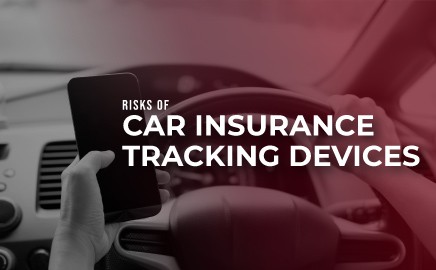Risks of Using Car Insurance Tracking Devices

You’ve probably seen advertisements for them everywhere. Or maybe your agent has filled you in on a “great way to save on your car insurance!” At the cost of a fractional reduction in your insurance premium, you’re asked to install a device in your car or an app on your phone that tracks your every movement and “rewards safe driving!” But don’t get caught up in the gimmicky marketing ploys – the risks of using car insurance tracking devices abound!
Drive Safe, Save Money, Reliquinsh Privacy
Every major car insurance company in the United States now has what is referred to as a “usage-based insurance program,” or UBI for short. Not sure what that is? These UBI’s come in cleverly varying names:
Allstate – Drivewise
State Farm – Drive Safe and Save
GEICO – Drive Easy
Progressive – Snapshot
USAA – Safe Pilot
Liberty Mutual – Right Track
Nationwide – SmartRide
Auto-Owners – True Ride
Famer’s Insurance – Signal
And, unfortunately, consumers are falling for these ploys. In fact, industry market projections surmise that up to two-thirds of auto insurance consumers will be enrolled in a UBI program by 2024. In exchange for a discount, two-thirds of policyholders will allow their insurance company to collect otherwise private information regarding their driving habits. This could potentially create major risks for using car insurance tracking devices.
Data Collection and Use in Legal Processes
The method of collection and type of data collected by car insurance tracking devices varies from insurer to insurer. Generally speaking, data includes phone usage, acceleration, deceleration (hard braking), time of day, and often speed. While some programs last a few months, others are continual. Some companies use car tracking devices directly installed into the vehicle’s event data recorder. Others use a phone’s data, accelerometer, and GPS information.
Since these programs first appeared, they have steadily increased in both market share and sophistication. As phones and vehicles become more intelligent and interconnected, insurers will likely use the data collected to lessen the exposure and risk posed by poor drivers. To lessen risks and drive up profits, increased data collection will be deemed necessary as long as it can be collected. In other words, we can expect the type and amount of data these UBI programs demand to increase as the capability to collect the information also increases.
See where this is going? It’s pretty likely that the data collected will and can be used in both criminal and civil legal processes.
Just as private corporations have been willing to turn over DNA databases to assist criminal prosecutions, insurance corporations will likely be compelled to turn over UBI data to assist criminal prosecutions. Or, in some cases, perhaps even just to prove that a person was in a certain location at a certain time. If you opt for a UBI that utilizes an app, remember, your insurance provider now has access to all of your movements if you’re carrying your phone, not just those you conduct in your own vehicle.
Maybe you’re thinking here “but I don’t break the law, I’m safe!” Read on.
Car Insurance Tracking Devices Used in Civil Litigation
Data pulled from car tracking devices can also be used in civil litigation proceedings. So, if you’re trying to pursue a claim against an at-fault driver and have a UBI installed in your car, the opposing defense counsel could subpoena this information and comb through it, looking for any data that could potentially pin fault on you. Depending on what is found in your data, this could potentially dramatically decrease your liability claim due to comparative negligence. Or bar you from filing a negligence claim altogether. A skilled car accident attorney will ask their client, as well as their passengers, about UBI programs. Remember, the UBI program on your phone doesn’t stop working just because you’re not in your own vehicle, so questioning passengers is also paramount! If anyone in the vehicle uses car tracking devices or has a UBI program installed on their cell phone, that data should be reviewed well in advance of production to opposing counsel.
Understanding how data is collected and potentially used in car accident claims is the first step to protecting yourself. The second step is retaining skilled legal counsel in instances where car tracking devices are installed and could reveal potentially harmful data to your claim
Contact our attorneys today by calling 886.758.0031 or submit an online contact form.

